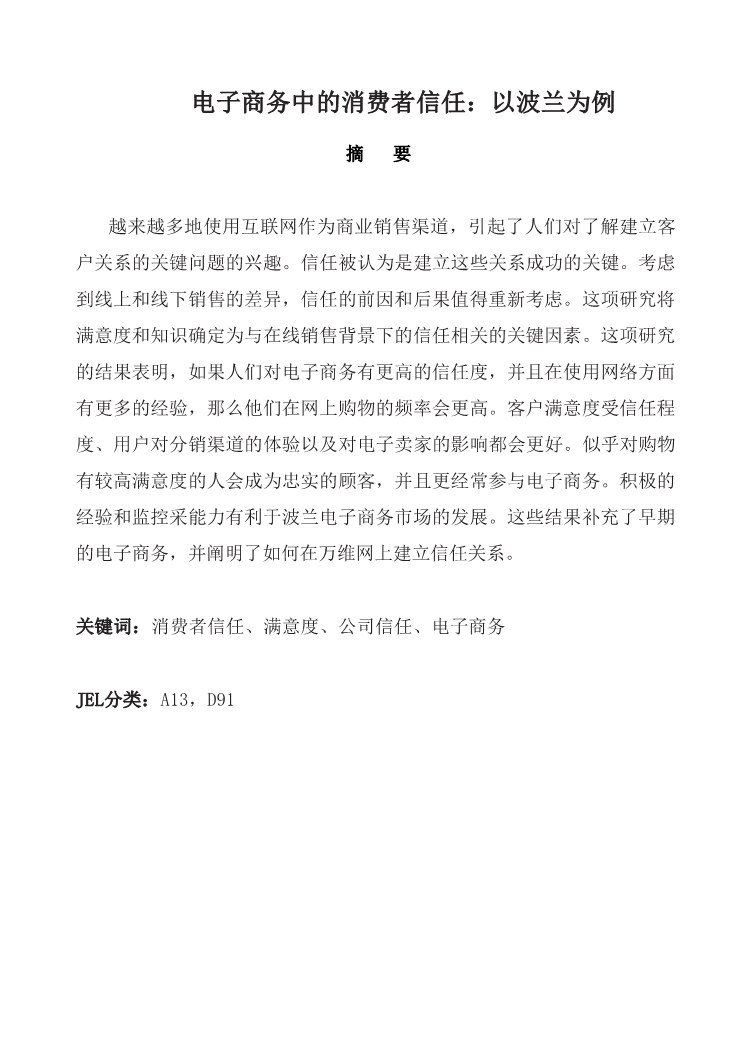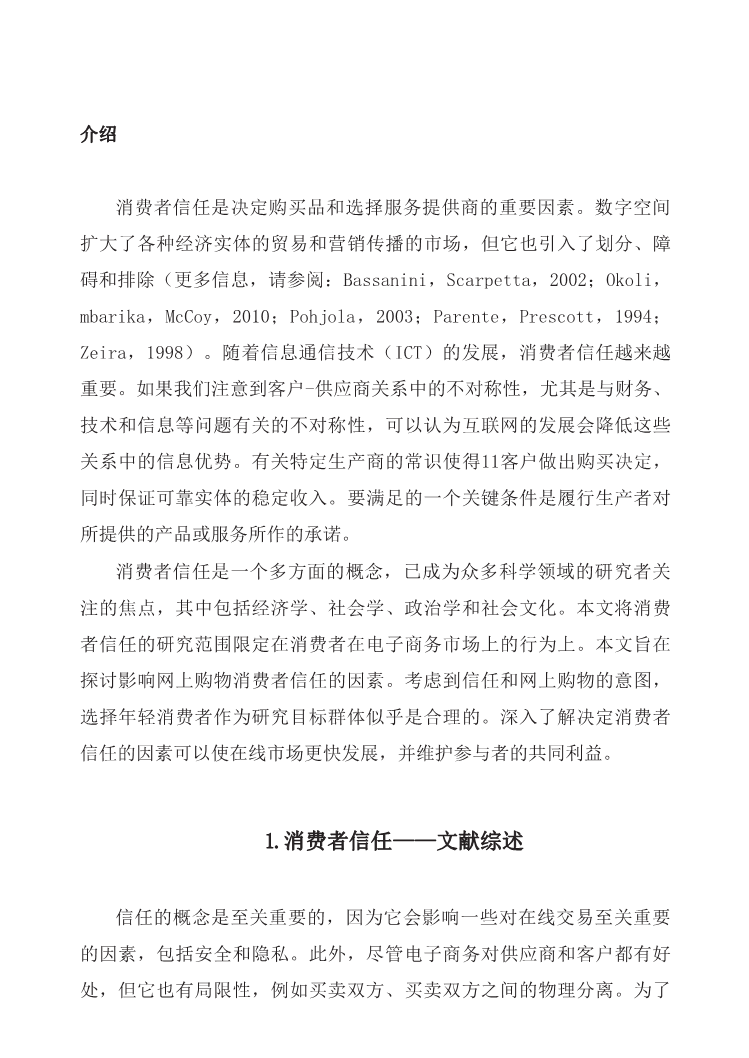Folia Oeconomica Stetinensia
Volume 18 (2018) Issue 2
DOI: 10.2478/foli-2018-0019
CONSUMER TRUST IN E-COMMERCE: THE CASE OF POLAND
Anna Rybak, Ph.D.
Czestochowa University of Technology Faculty of Management
Institute of Enterprise Management
J.H. Dąbrowskiego 69; 42-201 Częstochowa
ORCID: https://orcid.org/0000-0003-3981-0273
Received 23 March 2018, Accepted 10 October 2018
Abstract
The increasing use of the Internet as a commercial sales channel arouses interest in understanding key issues in building customer relationships. Confidence is considered the key to the success of building these relationships. Considering the differences between online and offline sales, the antecedents and consequences of trust deserve a reconsideration. This research identifies satisfaction and knowledge as key factors related to trust in the context of online sales. The findings from this study suggest that people buy online more often if they see a higher level of trust in e-commerce and have more experience in using the web. Customer satisfaction can be influenced by the level of trust as well as the user’s experience and knowledge about the distribution channel as well as the e-seller. It seems that people with a higher level of satisfaction with shopping become loyal customers and more often participate in e-commerce. Positive experience and the ability to monitor purchases favors the development of the e-commerce market in Poland. These results complement earlier arrangements for e-commerce and shed light on how to establish a trust relationship on the World Wide Web.
Keywords: consumer trust, trustworthiness, trust of the company, e-commerce
JEL classification: A13, D91
Introduction
Consumer trust constitutes a significant factor determining decisions about the purchase of a given product and selecting a service provider. Digital space has broadened the markets of trade and marketing communication of various economic entities, but it has also introduced divisions, barriers, and exclusions (for more, see: Bassanini, Scarpetta, 2002; Okoli, Mbarika, McCoy, 2010; Pohjola, 2003; Parente, Prescott, 1994; Zeira, 1998). As a result of the information and communication technology (ICT) development, consumer trust has grown in its importance. If we draw our attention to the asymmetry in customer-vendor relations pertaining, among others, to the issues of finances, technology, and information, the development of the Internet can be thought to reduce the information advantage in these relations. Thanks to the information exchange among social communities relating to a given entity, it is possible to avoid disappointment. Common knowledge concerning a given producer allows a customer to take a purchase decision and, at the same time, guarantees a steady income to a reliable entity. A crucial condition to meet is the fulfillment of a promise made by the producer with respect to the product or service on offer.
Consumer trust is a multiaspectual concept that has become a focus of interest of numerous researchers from various scientific disciplines, among others, economics, sociology, political science, and social culture. The present article limits its research scope with regard to consumer trust to consumers’ behaviors on the e-commerce market. The aim of the article is to probe into the factors impacting on consumer trust in online shopping. Taking account of trust and online shopping intentions, it seems legitimate to select young consumers for the research target group. A deeper insight into the factors determining consumer trust will allow online markets to develop faster as well as to safeguard mutual interests of their participants.
Consumer trust – an overview of literature
The concept of trust is crucial because it affects a number of factors essential to online transactions, including security and privacy. Moreover, although e-commerce brings benefits to both vendors and customers, it also has limitations, such as the physical separation between buyers and sellers, and between buyers and merchandise. In order to reduce the barriers, vendors must develop a trustworthy relationship to foster customer loyalty (Teo, Liu, 2007).
European Commission, by monitoring the consumer goods and services markets, pays attention to trust as a determinant of economic development. As a part of its research on consumer markets, it draws up a common economic policy. Its report clarifies that:
Consumers’ propensity to engage in (cross-border) online transactions may be facilitated or hampered by a number of factors, including perceived benefits and risks of e-commerce, confidence in online transactions, their awareness of key consumer rights online and the reliability of online comparison tools. Convenience in terms of time, lower prices and greater choice are the main reasons for shopping online. Consumers feel considerably more confident buying online in their own country (61%) than in other EU countries (38%). However, among consumers who have made at least one cross-border online purchase, the confidence to buy from online sellers in other EU countries is more than double that of those who have never done so. Slightly over half of the respondents (56%) in the EU knew that they have the right to return a new electronic product ordered by post, phone or the Internet four days after its delivery, without giving any reason. Consumers’ awareness of their right to a cooling-off period when purchasing digital content appears even lower, with a mere 9% of online consumers correctly identifying the latest stage up to which they have the right to withdraw from such purchase and get their mone
全文共25390字,剩余内容已隐藏,支付完成后下载完整资料


英语译文共 15 页,剩余内容已隐藏,支付完成后下载完整资料
资料编号:[451893],资料为PDF文档或Word文档,PDF文档可免费转换为Word
以上是毕业论文外文翻译,课题毕业论文、任务书、文献综述、开题报告、程序设计、图纸设计等资料可联系客服协助查找。


